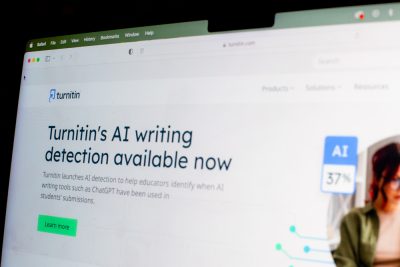Interim Provost and Chief Academic Officer Kenneth Lutchen introduced a new AI Task Force at Boston University last month which aims to positively integrate artificial intelligence into students’ educations.

On Sept. 7, Lutchen made an announcement to the Boston University community regarding the new University-wide task force.
“This is a committee that is focusing mostly on the academic-slash-research impact missions on the institution of generative AI,” Lutchen said.
The goal of the task force is to “help create a coordinated approach and set of best practices that enable BU to harness the great potential for this technology, guide its creative, positive use and guard against the possibility of abuse,” according to the statement.
The team is composed of selected faculty members who will meet regularly to develop recommendations for the innovative uses of generative AI at the school.
Lutchen said the first official meeting of the task force was positive.
“They were great. They were enthusiastic, and they understood that they were picked because they’re already thinking about how to use the technology in their respective disciplines,” he said. “They really wanted to make an impact and a difference.”
From here on out, the task force will be meeting every other week, and Lutchen said he is hopeful that “some good things will come out.”
Lutchen said his engineering background made him more aware of generative AI’s ability to “impact a lot of different fields.”
“I was already approached as engineering dean before I became provost by people who were from the industry and looking for ways they might use [AI] to impact the way they do product design and innovation,” he said. “It was becoming clear that there was a skill or knowledge base that it would help our students to have.”
Lutchen said the committee will review how AI will impact curriculum and testing at BU.
“Ultimately, the students and the faculty will come away with this with more creative engagement of how they can use, in a positive, cool way, Chat GPT or generative AI,” he said.
Lutchen acknowledged that it is important professors should not ignore the potential for students to seek AI assistance on their assignments.
“You’re basically saying, ‘here’s your homework assignment, and here’s the solutions at the same time, but try to ignore this other piece of paper,’” he said.
The AI Task Force “is not charged to come up with very strict can and can’t do’s” for the use of generative AI, Lutchen said. Instead, its job is “to provide guidance and thoughts so that deans, faculty and students can benefit from that.”
BU’s Policy on the Use of AI Text Generation details when it is appropriate to use AI as a resource.
Still, Julia Tobojka, a freshman in the College of Arts and Sciences, said she does not regularly use AI to her knowledge.
“I’m sure there’s some things that are AI that I didn’t know were AI that I use every day,” she said. “I think that [AI] is a good starting point if you’re trying to get ideas or inspiration, but I feel like it shouldn’t be abused in the sense that people tend to just gravitate toward it to do an assignment or to compose an entire piece from it.”
Tobojka said she believes the task force’s goal should be to “educate people on how it should be used properly, and how it maybe could potentially be misused as well.”
Madeline O’Leary, a freshman in the College of Communication, said the task force primarily represents a way to educate students on how to use AI responsibly.
“I think [the task force] should definitely support students and tell them how to actually use AI because it’s not like it’s going anywhere, so they should know how to use it responsibly,” O’Leary said. “There’s already plenty of resources that can track if people are using AI on submitted assignments, so I feel like that’s not as big of an issue, but you may just be teaching them how to use [AI] properly.”
Lutchen said instituting a process to ensure “positive uses” of AI is important in order to make sure it is “not misused.”
“I personally feel that you cannot legislate against innovation,” he said. “You can’t stop innovation.”























































































































